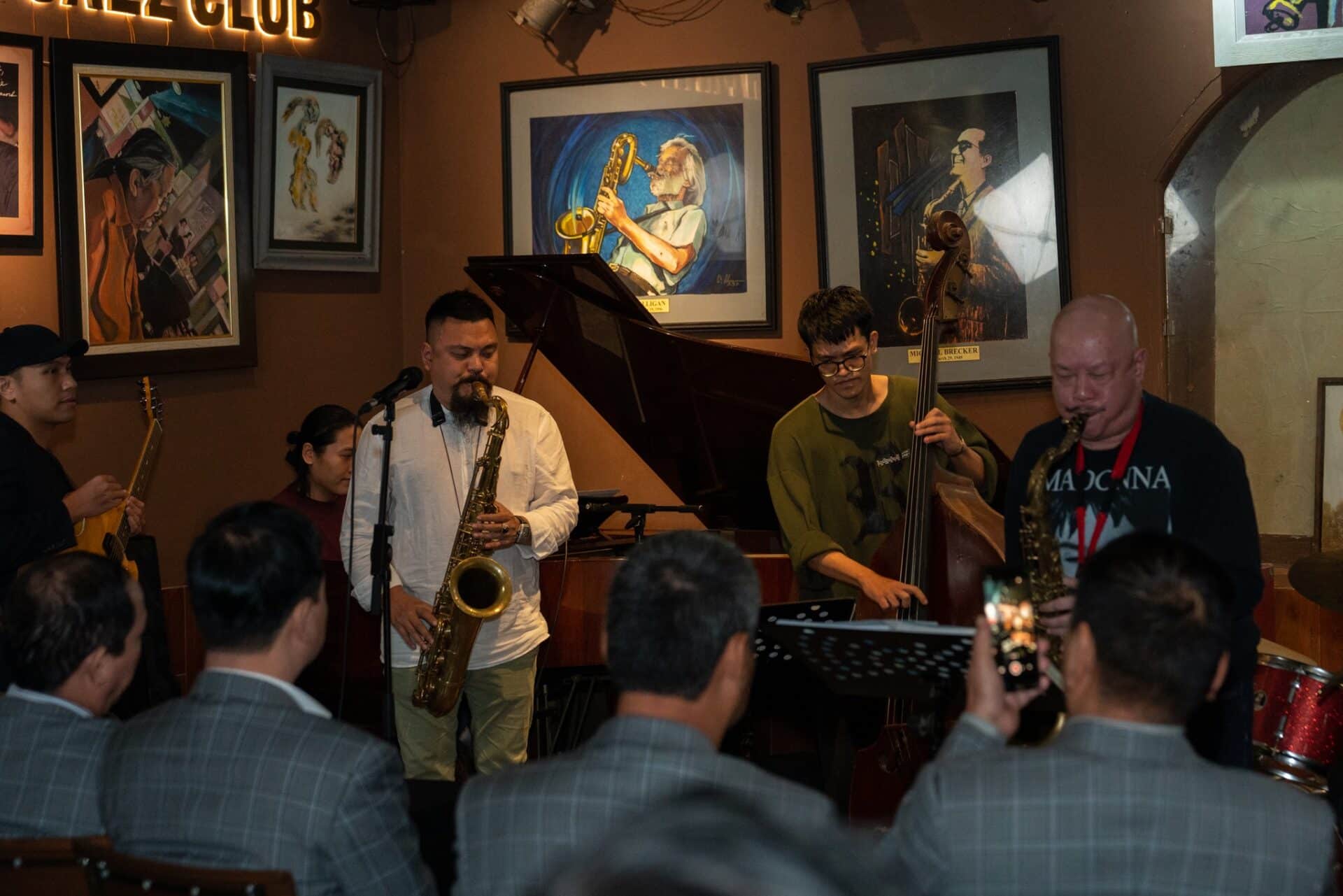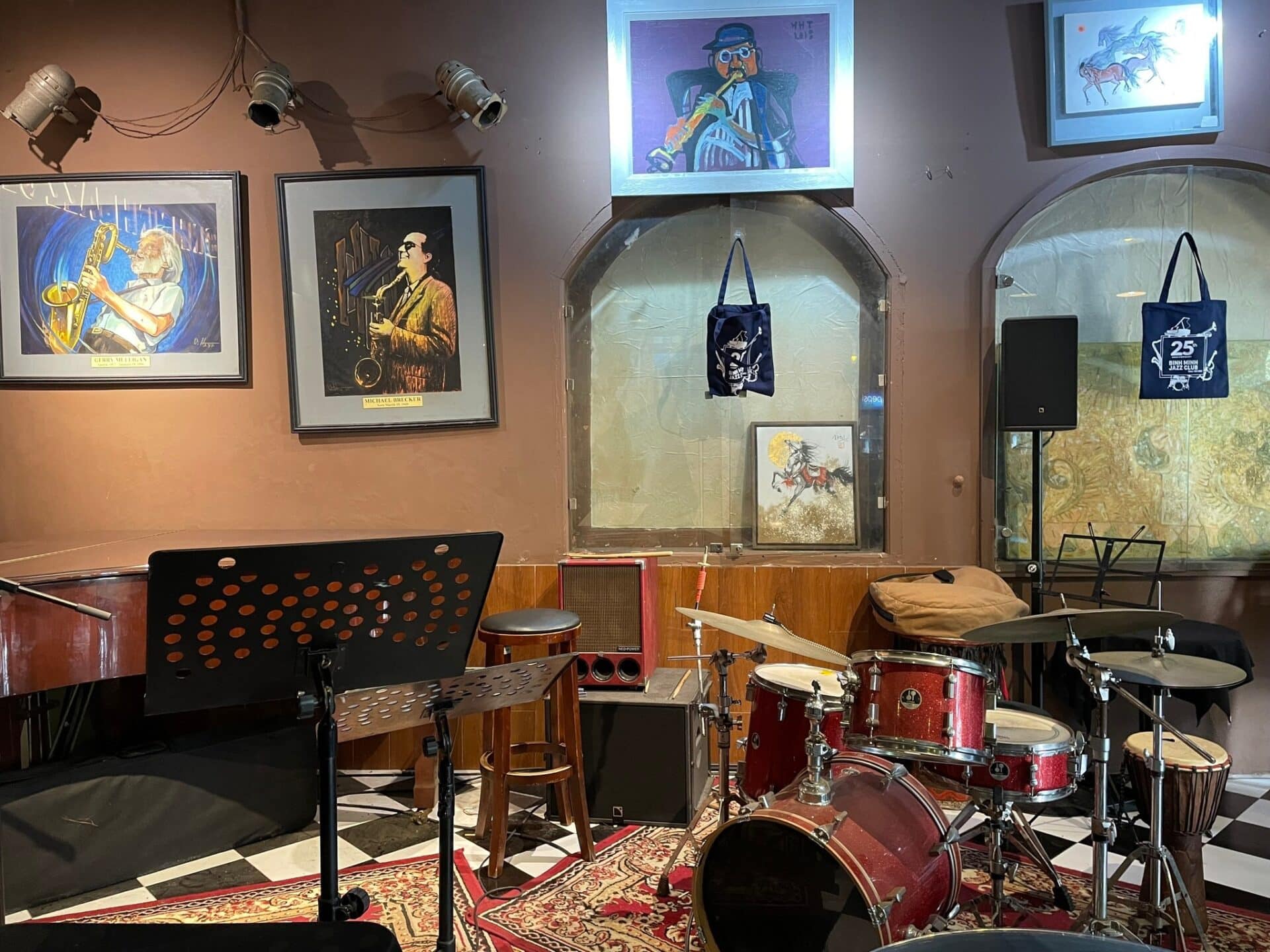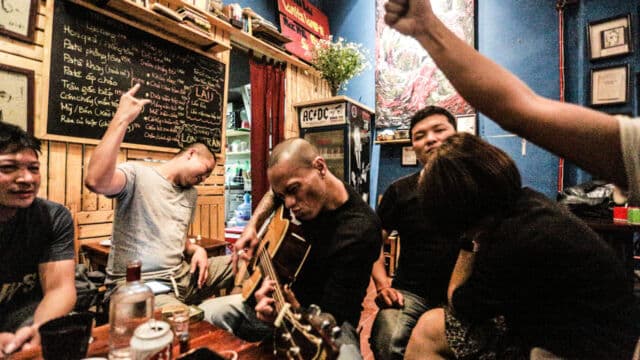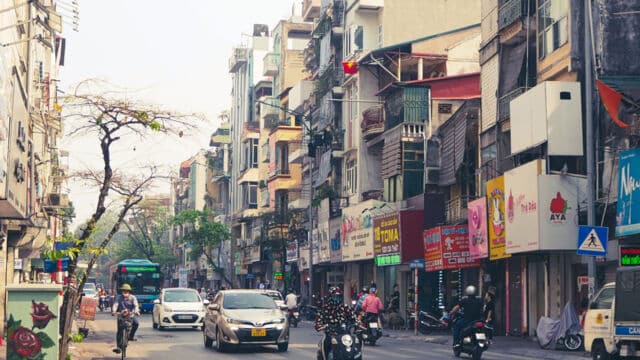Binh Minh’s Jazz Club is Like a Dragon With Nine Heads
Photo: Omega+
Bình Minh’s Jazz Club | 2,000 words
Translated from Vietnamese by Phương Anh Nguyễn
A Vespa swerved into an alley tucked away at the heels of the Hilton Hotel. It leisurely rode onto the pavement and parked right in front of the slumbering Bình Minh’s Jazz Club. The time to wake had yet to come—truly, the jazz club with its opening and closing hours is like Jekyll and Hyde, two personalities in the one body, so distinct they could be two different individuals.
Quyền Văn Minh hastily got down from the bike. He looked like a figure straight from a legend, someone who was possessed by a “saxophone god”, tall and stately, bulging belly, and handsome. He asked if I’d been waiting long.
Half a year ago, I was offered the opportunity to translate a biography of Mr. Minh and the jazz scene in Hanoi. Without contemplating if I could actually translate, in fact, without even knowing what the book was really about, I promptly accepted the offer. And now, half a year later, I would be speaking to Mr. Minh for the first time.
Nothing can compare to having the chance to talk to someone who people have ordained as “the father of Vietnamese jazz”, and inside his very own jazz club, no less—a place so integral to his being throughout the last 25 years it’s like an external circulatory system for him.
Yet perhaps this circulatory system is not working seamlessly, or maybe it’s because jazz, a music that takes the form of a shark restlessly moving to breathe, is a music that can only thrive by protesting all orders, for Mr. Minh realized that… he had brought the wrong key.
I watched as he fiddled with the locks, trying to open the main door, then the back door. Oh Mr. Minh, owner of the oldest post-war jazz club, who has bent over backwards to ensure its survival, who has given refuge to this music when no-one cared for it—not to mention that doing so stirred no lack of trouble, for at the time he started out such music had yet to be welcomed under the socialist order— who has never accepted defeat, even when, again and again, he had to relocate, at times the doors barely opening for three months before he had to close them again… and there he was, in front of me, with no means of entering his place. He had to call his granddaughter three times to get help.
If this jazz club has a soul, it definitely loves to play around with Mr. Minh.
Nearly 40 years after the Renovation, jazz clubs are no longer scarce in Hanoi—not abundant, but a significant presence. Most are adorned more luxuriously than Mr. Minh’s place. The contrast is most conspicuous during the day, when the lights have still not waned and the music has yet to sound, when one can see clearly the wrinkles, the crampedness, and the orange paint dulled by time. Don’t even entertain the idea of taking a viral picture for Instagram: this place is not photogenic. Rather, it looks like someone who has been to hell and back, endured it all, someone who has been kicked around by life, who has lived eighty lives and is only waiting for the next one to attain enlightenment.
I first discovered Mr. Minh on a CD in the record box of my family’s house. The CD was titled Birth 99’, and had been lying next to a few of Trần Mạnh Tuấn’s easy-to-listen-to ones, Trần Mạnh Tuấn being a former student of Mr. Minh. In contrast, Mr. Minh’s music is not easy on the ear, just as Bình Minh Jazz Club’s appearance is not easy on the eye.
One night, years later, I was listening to Mr. Minh performing a piece of his own composition on stage with Mr. Hùng Sơn at the club. That night the tables near the front were packed with groups of young western travelers and I was craning my neck to see if there were any empty seats. It was then that a woman in a small corner called me over to join her. I didn’t have the time to say thank you when she glibly declared: “I’m Sơn’s wife. See over there, that’s him on stage. They’ve played together for a long time.”
That, I know. Mr. Sơn was one of the first professional saxophonists to play at Bình Minh’s Jazz Club when it opened in 1997 at the Giảng Võ Exhibition Center. Then, it had the simple name of Minh’s Jazz Club. Many generations of jazz musicians attained popularity thanks to this club—a place considered to be a clandestine conservatory for those who happened to create jazz. A few stayed, a few left, and Mr. Sơn was the most loyal.
“Mr. Sơn plays terrifically well, doesn’t he?” I said, sincerely, not to flatter anyone. Of all the performers that night, Mr. Sơn stood out the most. His solo moments erupted like volcanoes with lava, pumice and hot ashes. The jazz at Bình Minh is truly like no other. It is far from the decoration jazz, the wallpaper jazz, the kind of jazz that is tentative, scared of getting bruised, that I have heard at several other places. People come here not to simply chit-chat and let the music echo and fade into the distance. No, they come here to listen to jazz.
“Well yes, but that hasn’t earned him anything,” the woman abruptly stated. It seemed as though that night, she needed someone to talk to, and as destiny had allowed, that person was me. And as her husband played his saxophone in a trance-like manner, below in the audience, the wife moaned about his stubbornness. She complained endlessly. But was she really complaining? Why did it sound almost like she was boasting about her husband? Prideful of his submission to the music, prideful of his faithfulness, prideful of his humbleness. “It’s a tough job, you know. Even Minh, his life is marked by hardships,” she said, giving a pitying tut.


Hardship might even be a modest way of putting it. “If I was trying to be funny, I’d say my life is as mushy as mashed potatoes” is what Mr Minh said to me the afternoon I met him at the sleeping Bình Minh’s Jazz Club. It seems his life has left many marks on the jazz club, which could be why the place can never look like other contemporary music cafes, with their resemblance to a plump, colorful, immaculate young lady.
This is a place born from eavesdropping on the “enemy’s” music—as a poem by Việt Phương goes, “to tune into the enemy’s radio is to widen the horizon”. Bình Minh’s Jazz Club is the place of a person who grew up at a time when jazz was the U.S. and the U.S. was the enemy. It is the place of a person who had to give jazz the label of “soft national music” to avoid government inspection when he first introduced it at the Vietnam Music Association’s recitals during the 80s. Nowadays, the jazz club lies right behind the Opera House, the cathedral usually reserved for state-sanctioned music where in 1994 Mr. Minh finally lifted off jazz’s disguise on its stage, so that jazz was ordained and named as jazz. But before reaching the neighborhood of the Opera House, the club had struggled with the fate of not being able to stay in one place, vagabonding from Giảng Võ to Lê Thái Tổ, then to Lương Văn Can, Tây Hồ, and Quán Sứ.
Sitting opposite Mr. Minh that day—a musician with a well of stories to tell, who insists that when God calls him, he will have to know that this jazz club still exists before he can close his eyes peacefully, in this place that has already died and been resurrected like a cat with nine lives—I knew better than ever that there will only be one Binh Minh’s Jazz Club.
Now, Vietnam has opened its doors. Though jazz still is a minority taste it’s not so alienating, not so distant. Opening a jazz club nowadays is even a smart and opportune move. It’s no longer like hitting your head against the wall, no-one has to go and fix instruments to keep a club in business; but equally, not many places give that feeling of people playing jazz as though they are “shouldering a casket and marching towards death” anymore.
“When I was in Birdland, New York, I thought of you. Charlie Parker was also a self-taught jazz musician, who has established his own legendary jazz club”, I said.
“Is that so? I didn’t know Charlie Parker also had a jazz club. But I’ve seen a biopic on him, and there’s a scene where in a fit of angry passion, he throws his saxophone away. Typical American, right? I wouldn’t be able to do that, no, not at all.”
The evening when I was sitting next to Mr. Sơn’s wife, watching Mr. Minh’s music performed as the show was nearing its end around midnight, Mr. Minh walked on stage again. He shared with the audience, half of whom were Westerners, half Vietnamese, that this ratio has changed a lot over the last two decades. Before, this place was primarily frequented by Westerners, but now more and more Vietnamese people visit. Therefore, he’d like to dedicate a final piece to Long, a long-time friend and his first protégé. He played Về quê, a lyric piece in the Northern folk style by veteran musician Phó Đức Phương.
The saxophone sounded, reverberating across the room. Outside, the night had ascended. The night, the only time when you can catch Hanoi in that silence of thirty years ago, the kind of silence that makes the saxophone’s sound all the more dense, as dense as an impasto painting with thick brushstrokes, as though the falling music notes could be caught in the palm of your hands and accumulate little by little into puddles there. Then, in an impromptu moment, Mr. Minh suddenly let go of his instrument, and hummed a tune. However, instead of the usual “la la la”, he humorously hummed “Long Long Long” to the rhythm of the audience’s clapping.
Sentimental songs are not what Quyền Văn Minh wants to play most at Binh Minh’s Jazz Club. One day, the jazz nights at this place will be all true jazz, pure jazz, and Vietnamese jazz—that’s the dream! But every time he brings the saxophone to his lips, he always seems to be playing from the bottom of his heart, playing as if this is the only moment left to play jazz; he contemplates and meditates with the instrument.
Two hours had passed since our conversation began, and Mr. Minh stood to go out for a smoke. When he got up, my eyes traveled to the walls covered with pictures of him and the artists who had visited here—it included my idols Herbie Hancock and Joe Henderson in their prime! There were also posters of concerts that changed the history of Vietnamese jazz, and even articles about Mr. Minh’s life, one with a blasphemous title: “Quyền Văn Minh took jazz as his wife.”
Back in 1997, no-one in Vietnam probably believed in this jazz club’s existence besides Mr. Minh. The jazz club was, if not like a cat with nine lives, like a dragon with nine heads, with every head that was chopped off, another springing up. And throughout all those years, Minh’s Jazz Club never missed one night of performance: seven days a week, 365 days a year. Not for a single night did jazz music not resound. Not one single night. Firmly and persistently like the sun.
Since the club moved to 1 Tràng Tiền, it’s been nine years. Though nine years may be long, it’s not forever. If one day, the jazz club is no longer at this location, that’s fine. For if it’s no longer at 1 Tràng Tiền, it will simply be at another address. It could be anywhere. Somewhere, at nine o’clock, there will be jazz.
At some point, the sky had darkened, and I excused myself. But I wouldn’t be gone for long, for another night of jazz was on the horizon.
© Hiền Trang
English translation © Phương Anh Nguyễn
Commissioning editor: Quyên Nguyễn





